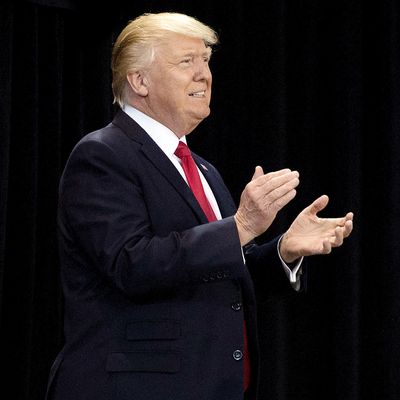
President Trump has access to the classified findings of the most powerful spying apparatus on planet Earth. But he still prefers to get his daily intelligence briefings from Steve Doocy.
Two weeks ago, James Comey confirmed that the FBI is in the midst of a months-long investigation into ties between the Trump campaign and Russian hackers. Two days later, the Republican tasked with leading the House’s investigation into Russian hacking called a press conference to discuss an entirely difference subject. After meeting with officials on White House grounds, Devin Nunes discovered that Trump transition officials had been incidentally surveilled when they contacted certain foreign agents — and that the names of those Trump officials had not been redacted from intelligence reports.
For the past 12 days, conservative media outlets have worked diligently to convince their audiences that Nunes’s claim is a bigger story than Comey’s. And on Monday morning, Fox & Friends reported this “blockbuster”: The official who decided to unmask the names of Trump associates in intelligence reports was “very high up.”
When private citizens get incidentally surveilled — by contacting foreign agents who are the subjects of legal surveillance — their names are normally “masked” in intelligence reports. However, operatives can “unmask” those names if doing so is necessary to comprehend the intelligence described in a given report. The discretion for determining when unmasking is appropriate lies with high-ranking officials in each agency (at the NSA, 20 people have the authority to “unmask”).
Thus, to say that the unmasking was ordered by someone “very high up” is to say that it was, almost certainly, ordered by someone with the legal authority to make that call. Which seems like the opposite of “blockbuster” news.
However, Bloomberg’s Eli Lake suggests that the official in question was former national security advisor Susan Rice, whose immediate proximity to Barack Obama makes the story a bit more interesting:
White House lawyers last month discovered that the former national security adviser Susan Rice requested the identities of U.S. persons in raw intelligence reports on dozens of occasions that connect to the Donald Trump transition and campaign, according to U.S. officials familiar with the matter.
Still, as Lake notes, there is little reason to question the legality of Rice’s actions.
The standard for senior officials to learn the names of U.S. persons incidentally collected is that it must have some foreign intelligence value, a standard that can apply to almost anything. This suggests Rice’s unmasking requests were likely within the law.
Regardless, Fox’s report contained other interesting tidbits: According to an anonymous source who spoke with the network, the Trump team was incidentally surveilled even before the mogul won the GOP nomination; the conversations recorded had nothing to do with Russia; the reports were widely circulated within the Obama administration; and the way the unmasking was handled was “unprecedented.”
The president instantly endorsed Fox’s report.
Two hours later, Trump forwarded the network’s information to the FBI, via a Twitter tag.
The president had already highlighted the same story, which Fox broke on Friday, over the weekend.
As the president has frequently insisted, one should treat news stories based on a single anonymous source with skepticism.
But the strange thing about the right’s narrative on this whole surveillance story is that, even if its core allegations are true, it’s far from clear that they would flatter Trump or his associates. Fox’s report does not allege that illegal surveillance took place. So, if Trump aides were incidentally surveilled starting in early 2016, then that means they were in contact with targets of foreign surveillance from the early days of the mogul’s campaign. Which is a bit odd.
What’s more, if the degree of unmasking was “unprecedented,” this may have merely reflected the unprecedented fact that the FBI had cause to suspect a major presidential campaign was colluding with a foreign power. After all, if the goal was, instead, to use the surveillance state to undermine Trump’s campaign — as the president implicitly alleges — why would Barack Obama have withheld public disclosure of the FBI’s investigation until after Election Day?
Finally, many former Obama administration officials have admitted that they sought to spread intelligence on the Trump campaign throughout the government before his inauguration, because they were concerned that the new president might try to meddle with an ongoing investigation into his associates.
To view such a measure as unreasonable on its face, one would need to forget that the FBI’s investigation of the Trump campaign is now a publicly known fact. But then, of course, encouraging such amnesia may be the whole point.






























